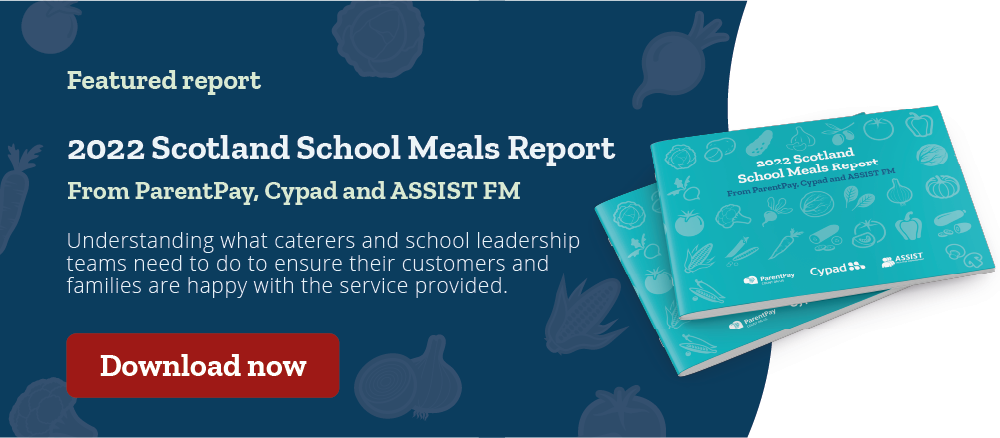Co-written with Chris Ross, Head of Catering at City of Edinburgh Council
School caterers work tirelessly to provide nutritious school meals that meet the needs of parents and pupils – but it’s a more complex challenge than many realise, and goes far beyond simply putting a plate of food in front of a child. ParentPay are pleased to be partnering with ASSIST FM to deliver a collaborative blog series around the provision of school meals in Scotland and beyond. As the voice of Scottish Local Authority FM services, ASSIST FM represent the excellent work that local authorities do to provide Scotland’s school children with quality school meals. Their commitment to supporting public sector organisations in providing service of the highest quality makes them valuable partners in examining the state of school meal provision.
Alongside this blog series, we recently worked with ASSIST FM to produce our 2022 Scotland School Meals Report. The report investigates what caterers and school leadership teams need to do to provide a service that customers and families are happy with, and contributes to the body of research providing an ongoing understanding of parents/guardians. You can download the 2022 Scotland School Meals Report online.

ASSIST FM’s support allowed us to capture responses from parents across Scotland, ensuring our research was truly representative of the UK overall. The Scotland survey attracted extremely positive engagement, with a total of 15,964 responses from parents providing a robust sample size across all school years.
These blogs will highlight a series of topics surrounding the provision of school meals in Scotland and beyond, and advise on how you can take action if you recognise any of the issues in your school or local authority.
Following the introduction of universal free school meals for children in P1-P5, caterers in Scotland have been working hard to deliver more lunches than ever to school pupils. The Scotland School Meals Report found that 82% of pupils in Scotland had a school meal at least once a week, with 50% of them having school meals every day. According to Chris, that amounts to around 350,000 school meals across the country prepared every day across Scotland’s 32 local authorities.

And that’s not the only legislation changing the face of school meals in Scotland: Chris explains that the country also has the most stringent school food standards of any UK nation, since the Nutritional Requirements for Food and Drink in Schools (Scotland) Regulations came into force in 2020. The requirements set out acceptable levels of salt, sugars and fats in school meals, as well as other measures to build a culture of health and wellbeing within schools. Catering teams are at the front line of delivering on these regulations, and form an integral part of a whole-school approach to health and wellbeing which gives children and young people the right information about making positive food and drink choices.
Chris also tells us how school catering services contribute in various, and often unseen, ways to the local community: they support local suppliers, contribute to the creation of local employment and community wealth building, work with schools to teach culinary skills and food provenance, and much more. He explains that caterers often work closely with small and large suppliers to respond to feedback, and to adapt products to better align with emerging values and factors that matter to schools and parents. For example, nearly 1 in 5 parents surveyed in our Scotland School Meals Report said that sustainability was ‘definitely’ a factor when choosing school meal provision, and 48% said that the nutritional value of school meals was a key factor in the decision.

In the upcoming blog series, we will be analysing some of the most important topics surrounding school meal provision in the UK right now. The first blog will explore the importance of having cooking on the school curriculum, and the benefits it has in helping children learn about nutrition and looking after themselves. The second will focus on the issue of sustainability within school meal provision, and the actions that local authorities, schools and caterers can take to reduce their impact on the environment, featuring a shining example from East Ayrshire. Finally, the third blog will examine how Glasgow local authority has embraced the power of collaboration to tackle challenges and make improvements, and how organisations can facilitate better collaboration to reach common goals more effectively.
Want more industry insight and expert advice? Sign up to our blog subscriber list to be notified when we release new content.
